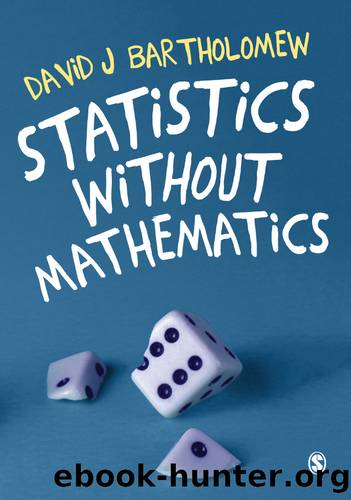Statistics without Mathematics by David J. Bartholomew

Author:David J. Bartholomew [Bartholomew, David J.]
Language: eng
Format: epub
Tags: Social Science, Statistics, Reference, Research
ISBN: 9781473934337
Google: 0htiCgAAQBAJ
Publisher: SAGE
Published: 2015-10-19T04:11:48+00:00
Other Random Sampling Methods
A simple random sample can be drawn without knowing anything at all about the population members except for some identifying characteristic. In the case of human populations this may be a name or address. In practice we often have more information about sample members, and as this may be relevant to the object of the enquiry, it would be a pity not to make use of it. For example, we may know the age, place of residence or occupation of population members. It would seem sensible to make sure that our sample reflects the composition of the population in these respects. We do not know in advance, of course, whether the subject of our enquiry is correlated with any of these known factors, but by including them in the design we make sure that they are not overlooked. This is done by what is called stratified random sampling. The sub-populations formed according to place of residence, or whatever, are called strata. This makes it possible to sample separately from each stratum. It also offers the prospect of sampling some strata more intensively if that offers the benefit of greater precision. For example, if the strata had been formed on the basis of educational level reached, it might be that incomes varied relatively little within some strata and there might therefore be an advantage in sampling relatively fewer individuals from those strata. Texts on sample design for finite populations go into these matters in much more detail.
Sampling finite populations of humans may be very expensive, and there are designs which are intended to minimise costs. The location of potential respondents will involve interviewer travelling costs in face-to-face surveys. Having arrived at a remote location, for example, it may pay to obtain more information from respondents near that location because that involves very little additional travelling and so is relatively cheap. Cluster sampling is designed to take advantage of this possibility. The term cluster expresses the idea that the population is grouped around particular locations. The simplest cluster sampling design involves two stages: first we select clusters, and then the individuals within a cluster. This is done in such a manner as to minimise the total cost of sampling â or to get the optimum allocation within a given budget.
Without wishing to digress into the practical hazards of using samples from finite populations, it is important to remember that, even though we have used a random sampling technique, the sample available for analysis may have a number of biases. Respondents who are unobtainable, or refuse to respond, for example, may well not be typical and so their absence biases the whole sample.
Download
This site does not store any files on its server. We only index and link to content provided by other sites. Please contact the content providers to delete copyright contents if any and email us, we'll remove relevant links or contents immediately.
Cecilia; Or, Memoirs of an Heiress — Volume 1 by Fanny Burney(32558)
The Great Music City by Andrea Baker(32018)
Cecilia; Or, Memoirs of an Heiress — Volume 2 by Fanny Burney(31956)
Cecilia; Or, Memoirs of an Heiress — Volume 3 by Fanny Burney(31941)
We're Going to Need More Wine by Gabrielle Union(19046)
All the Missing Girls by Megan Miranda(16023)
Pimp by Iceberg Slim(14506)
For the Love of Europe by Rick Steves(14121)
Bombshells: Glamour Girls of a Lifetime by Sullivan Steve(14073)
Talking to Strangers by Malcolm Gladwell(13370)
Norse Mythology by Gaiman Neil(13363)
Fifty Shades Freed by E L James(13239)
Mindhunter: Inside the FBI's Elite Serial Crime Unit by John E. Douglas & Mark Olshaker(9339)
Crazy Rich Asians by Kevin Kwan(9290)
The Lost Art of Listening by Michael P. Nichols(7506)
Enlightenment Now: The Case for Reason, Science, Humanism, and Progress by Steven Pinker(7311)
The Four Agreements by Don Miguel Ruiz(6765)
Bad Blood by John Carreyrou(6621)
Weapons of Math Destruction by Cathy O'Neil(6279)
